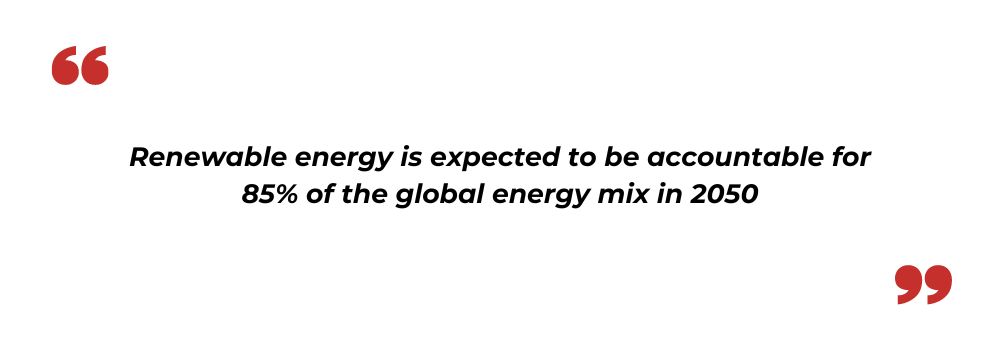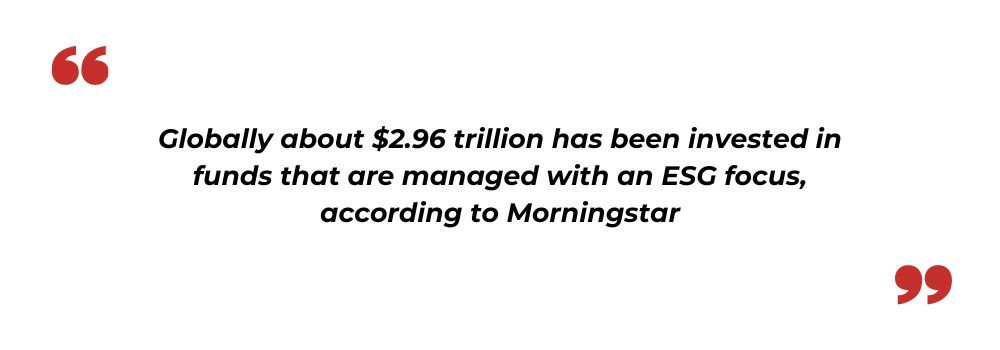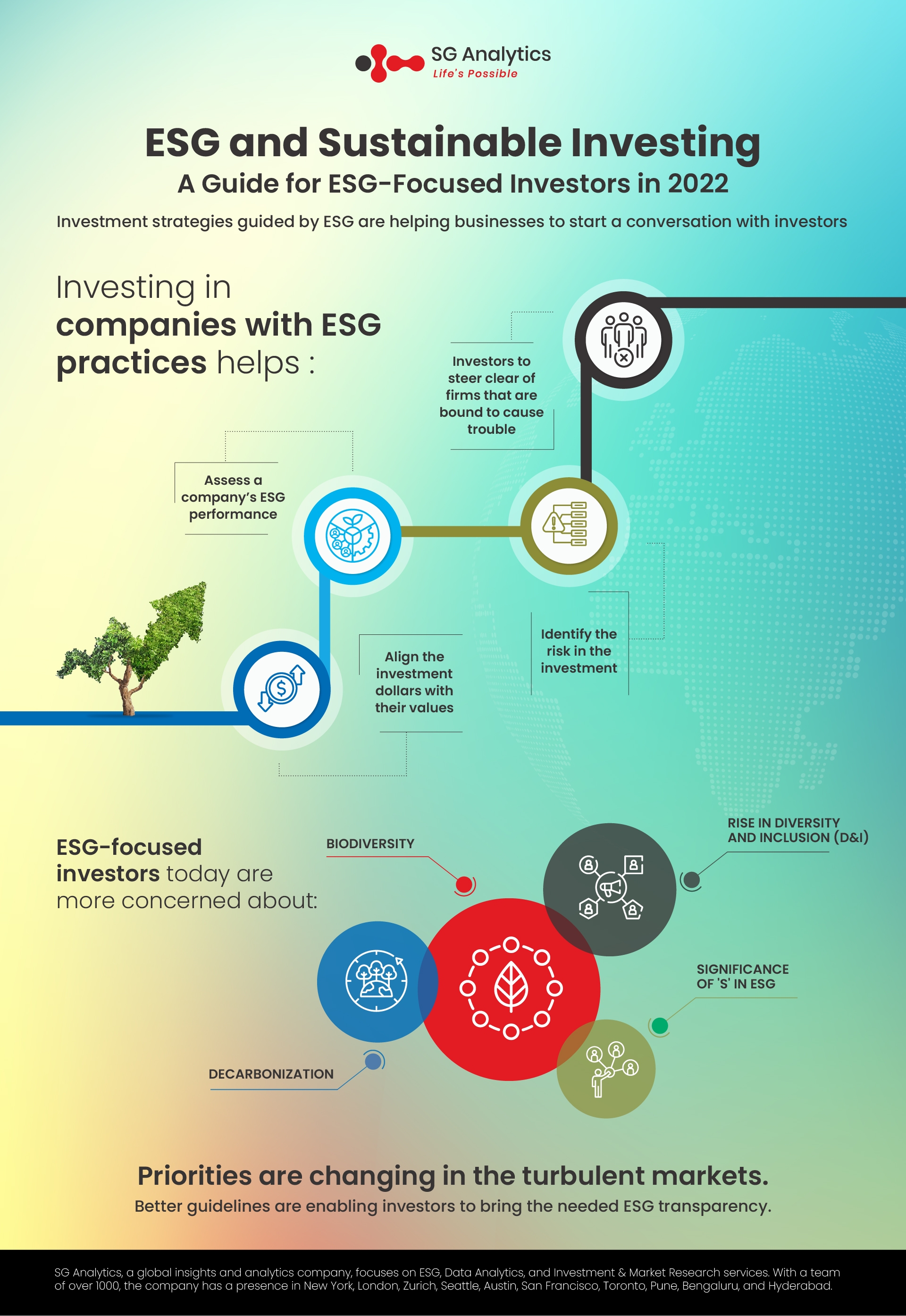While investment and sustainability might seem like two entirely opposite aspects, the recent climate trends have forced them to collide. Often the process of making investment concerns vetting a company based on factors including business model, historical data performance, annual reports, and much more.
However, today investors have started considering additional fundamentals, i.e., ESG or Environmental, Social, and Governance. These aspects, when combined, form the basis of any new investment in an organization. Investor demand for sustainable investment funds to be incorporated into the environmental, social, and governance (ESG) factors are expected to grow.

Investors are more focused on the short term right now. With interest rates on the rise and the cost of living soaring, Investors are more concerned about not losing their money rather than making 10% or 20%. Sustainable long-term value creation can be deemed impossible if corporates are not responsive to the permanent migration to building a low-carbon and climate-constrained economy.
This rapid growth in ESG incorporation has been a key factor in the investor exodus, with asset managers now seeking to demonstrate strong sustainability credentials. For organizations, there is no escaping the growing interest of investors in environmental, social, and corporate governance investing. With investors updating and finalizing their proxy voting guidelines for 2022, there will likely be potential for more votes being cast against board directors of organizations that do not demonstrate an understanding of ESG and sufficient disclosure.
Read more: Emphasizing the 'S' in ESG: How can HR Leaders Put ESG values in Context

What do You Mean by ESG Investing?
ESG investing practically signifies considering environmental, social, and governance criteria when evaluating enterprises to invest in and favoring companies that rate well with the set ESG criteria.
-
Environmental factors concern elements like - does the company contributes to greenhouse gas emission or generate other forms of pollution; how they conserve energy; their efforts around climate change; and how they use land, water, and other natural resources.
-
Social factors concern aspects like a company’s safety standards, its efforts to promote diversity and inclusion, and its impact on the community.
-
Governance factors include elements like transparency in taxes and reporting, the structure of a firm board of directors, and its core values, especially integrity.
To assess the ESG factors of an organization, investors look at companies’ ESG scores when deciding on ESG investing. Investing in companies with ESG practices is an attractive investment strategy for a few reasons.
-
It helps them to align their investment dollars with their values.
-
Assessing a company’s ESG performance is a useful indicator of the risk as an investment.
-
Identifying ESG risks enables investors to steer clear of companies that are bound to cause trouble.

How Does ESG Affect Performance?
Measuring ESG investment performance is a complex factor as it depends on how ESG is being employed and measured. Two large meta-analyses of ESG impacts investigate the relationships between ESG factors and operating as well as investment performance. An analysis of over 1,000 studies undertaken between 2015 and 2020 found that 58% of firms showed a significant optimistic relationship for operating performance.
For investors who use ESG to guide investments, two main factors include - employing a positive tilt or a negative screening. However, if investors want to avoid owning, supporting, or receiving profit from companies, they agree with supporting those whom they believe are making a positive impact. Although this negative screening strategy avoids complicity, it does not allow investors to engage with management to influence the changes. This strategy allows diversification across sectors as well as helps investors in retaining their ability to vote for companies that are invested in building a better future.
Read more: Integrating ESG in Company Culture – A Move to Drive Resilience
However, the relationships between ESG factors and investment returns are mixed. As ESG criteria are not understood and measured in the same way in multiple industries, it is still unclear whether good ESG behavior is likely to lead to good performance or if better-performing firms simply have additional resources to conduct ESG activities.

The Shifting Investment Focus in 2022
The top priority for ESG-focused investors in 2022 is likely to remain the decarbonization of the economy, commencing with the energy sector. While it has been the primary focus of mitigation in recent years, emissions from energy-related sectors still account for 70% of the global total.
Investors seeking ESG opportunities in 2022 are focused on following ongoing trends and emerging as specialist ones. Decarbonization in the energy sector will keep upward track of demand investment for decades to come.
The rising demand for power and energy is also playing a supporting factor and is expected to double by 2050. This has placed a priority on establishing renewable generation sources, and progress is underway. Renewable energy is expected to be accountable for 85% of the global energy mix in 2050.
As per the International Renewable Energy Agency or IRENA, the investment flow required to make this happen will amount to an estimated US$115 trillion. This constitutes allocating US$34 trillion for renewable energy, US$52 trillion for energy efficiency, tech as well as materials, and US$29 trillion for energy infrastructure and transportation. Clean energy is emerging as the key to combating climate change. However, the global transition to net zero carbon emissions is accelerating across industries.
.jpg)
Read more: The Rise of Sustainable Finance: 2022 Impact Investment Trends
Along with energy and emissions, companies are also expected to focus on more specific aspects of the ESG spectrum- Biodiversity. Businesses are now focusing their attention on the need to preserve and restore the biodiversity of the planet. One of the headlines accords at COP26 was the Declaration on Forests and Land Use - a pledge aimed to end deforestation by 2030, covering almost 85% of all forests on the planet.
Another component that is gaining strong support from the investors is the ‘S’ in ESG. An interest in the social elements of the ESG is accompanying the transition to building a net-zero world. This gain has added impetus to initiatives to rectify the impacts of the pandemic.
Companies that reward increased diversity and inclusion (D&I) in the workplace are also showing up as a popular category on the investor radar. From more women employed and stakeholders in the boardrooms to financial inclusion in emerging global economies, asset managers are integrating more D&I considerations in their investment decisions.

Key Takeaways
-
Better guidelines are enabling investors to bring the needed transparency to ESG labels.
-
The market extremities are testing the resilience of ESG policies for an organization as well as its shareholders.
-
In three broad categories - the Europe-focused, US-focused, and global - ESG equity investments have done better in 2022, on average, than their non-ESG counterparts in the market.
-
The rapid growth in ESG funds is coinciding with a bull market that ended in 2022, making this lull a test for portfolio managers as well as investors.
Read more: ESG metrics for Businesses - Time to Deliver the Promise of Sustainability

Conclusion
Priorities are changing in the turbulent markets. Board members are now recalibrating their oversight to accommodate these changes and meet the requirements of regulators, stakeholders, as well as investors. Due to the growing scrutiny and market expectations, organizations realize value, identifying opportunities quickly and confidently facing them with a more rigorous ESG governance and data measurement process.
Asset managers are also adding ESG matters as a standing agenda item in their strategies to offer a deeper understanding of the company’s disclosure process as well as to regularly assess the company’s progress, risk, financial implications, and the integration of ESG considerations into the core business. While this seems logical, investors are also focusing on companies delivering fewer ESG returns in the short run than those performing poorly on material ESG criteria. However, investors are happy to pay more when good returns are being generated.
Considering all the parameters, it is also important for businesses to be overwhelmed by this world of ESG ratings and trends. By incorporating investment strategies guided by environmental, social, and governance factors, businesses can start a conversation and discover a broad range of ways to incorporate ESG investing into their long-term plan. This will not only help attract more ESG-focused investors but also will help in shaping a strong investment strategy.
With a presence in New York, San Francisco, Austin, Seattle, Toronto, London, Zurich, Pune, Bengaluru, and Hyderabad, SG Analytics, a pioneer in Research and Analytics, offers tailor-made services to enterprises worldwide.
A leader in ESG Consulting services, SG Analytics offers bespoke sustainability consulting services and research support for informed decision-making. Contact us today if you are in search of an efficient ESG integration and management solution provider to boost your sustainable performance.









